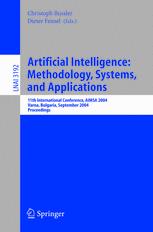

Most ebook files are in PDF format, so you can easily read them using various software such as Foxit Reader or directly on the Google Chrome browser.
Some ebook files are released by publishers in other formats such as .awz, .mobi, .epub, .fb2, etc. You may need to install specific software to read these formats on mobile/PC, such as Calibre.
Please read the tutorial at this link: https://ebookbell.com/faq
We offer FREE conversion to the popular formats you request; however, this may take some time. Therefore, right after payment, please email us, and we will try to provide the service as quickly as possible.
For some exceptional file formats or broken links (if any), please refrain from opening any disputes. Instead, email us first, and we will try to assist within a maximum of 6 hours.
EbookBell Team

4.7
96 reviewsThe 11th Conference “Artificial Intelligence: Methodology, Systems, Applications – Semantic Web Challenges” (AIMSA 2004) continued successfully pursuing the main aim of the AIMSA series of conferences – to foster the multidisciplinary community of artificial intelligence researchers, embracing both the theoretic underpinnings of the field and the practical issues involved in development, deployment, and maintenance of systems with intelligent behavior. Since the first conference in 1984 AIMSA has provided an ideal forum for international scientific exchange between Central/Eastern Europe and the rest of the world and it is even more important nowadays in the uni- ing Europe. The current AIMSA edition is focused on Semantic Web methods and technologies. The Internet is changing the everyday services landscape, and the way we do things in almost every domain of our life. Web services are rapidly becoming the enabling technology of today's e-business and e-commerce systems, and will soon transform the Web as it is now into a distributed computation and application framework. The emerging Semantic Web paradigm promises to annotate Web artefacts to enable automated reasoning about them. When applied to e-services, the paradigm hopes to provide substantial automation for activities such as discovery, invocation, assembly, and monitoring of e-services. One hundred and seventy-six interesting papers were submitted to the conference.